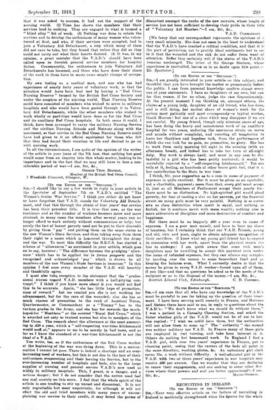[TO THE EDITOR OF THE " EIPECIATOR.”) am greatly interested
in your article on this subject, and thankful that you have brought the matter so prominently before the public. I can from personal knowledge confirm almost every one of your statements. I have no daughters of my own, but can for that reason, if for no other, judge the ease dispassionately. At the present moment I am thinking on, amongst others, the claims of a young lady, daughter of an old friend, who has done, and is still doing, her modest share of woman's work for the nation most patiently and most courageously—a typical worker, thank Heaven! but one of a class which may disappear if we are not careful. My young friend, though only nineteen years of age, has been doing the heavy and monotonous work of an auxiliary hospital for two years, enduring the enormous strain on nerve and muscle without complaint, and resisting all temptation to leave her thankless and hopeless task, from the performance of which she can look for no gain, no promotion, no glory. She has to work from early morning till eight in the evening (with an afternoon break), and indeed has to take her turn at all-night duty. Her work is always hard, and must in any case be dis- tasteful to a girl who has been gently nurtured; it would be scornfully rejected by a "self-respecting kitehenmaid." Yet she toils at it, feeling, as hundreds of other brave girls feel, that it i:: her contribution to the State in war time.
I think, Sir, your suggestion as to a sum in name of payment of expenses is quite excellent. But it must be given as an equitable, not a charitable, payment; more than that, every girl must accept it, just as all Members of Parliament accept their yearly fee : there must be no distinction. No high-spirited girl would plead poverty, for fear of casting a slur on her parents, yet the financial strain on many girls must be very painful. Nothing is so corro- sive as class distinction when merit is equal, and nothing 60 foolish, for it confuses merit with mere wealth; nothing also is more subversive of discipline and more destructive of comfort and happiness.
But there must be no beggarly .820 a year even in name of expenses. I sin a poor man myself, and have to bear my share of taxation, but I certainly think that our V.A.D. friends, young and old, rich and poor, ought to obtain adequate recognition of their sacrifices. (I know what my young girl friend has to expend in connexion with her work, apart from the physical strain she has to undergo.) I am quite aware that some rich men's daughters may be unwilling to accept this payment even under the name of refunded expenses, but they can silence any scruples by handing over the money to some benevolent fund and so keeping the balance even, What I earnestly desire is that the money be given to every V.A.D. worker—forced upon all of them, If you like—and that no questions be asked as to the Deeds of the recipient or as to the disposal of the money.—! am, Sir, Ise., Scottish Liberal Club, Edinburgh. C. D. CAMPBELL.


































 Previous page
Previous page